Related Research Articles

Thrissur, formerly Trichur, also known by its historical name Thrissivaperur, is a city and the headquarters of the Thrissur district in Kerala, India. It is the third largest urban agglomeration in Kerala after Kochi and Kozhikode, and the 21st largest in India. The city is built around a 65-acre (26 ha) hillock called the Thekkinkaadu Maidaanam which seats a large Hindu Shiva Temple. It is located 304 kilometres (189 mi) north-west of the state's capital city, Thiruvananthapuram. Thrissur was once the capital of the Kingdom of Cochin, and was a point of contact for the Assyrians, Greeks, Persians, Arabs, Romans, Portuguese, Dutch and English.
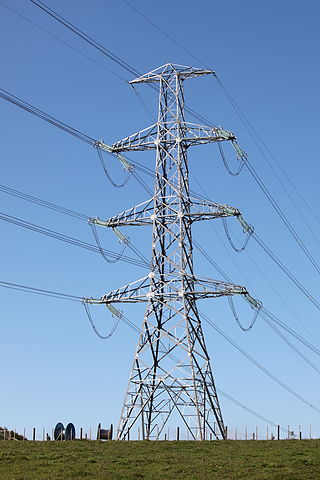
The electric power industry covers the generation, transmission, distribution and sale of electric power to the general public and industry. The commercial distribution of electric power started in 1882 when electricity was produced for electric lighting. In the 1880s and 1890s, growing economic and safety concerns lead to the regulation of the industry. What was once an expensive novelty limited to the most densely populated areas, reliable and economical electric power has become an essential aspect for normal operation of all elements of developed economies.

Ontario Hydro, established in 1906 as the Hydro-Electric Power Commission of Ontario, was a publicly owned electricity utility in the Province of Ontario. It was formed to build transmission lines to supply municipal utilities with electricity generated by private companies already operating at Niagara Falls, and soon developed its own generation resources by buying private generation stations and becoming a major designer and builder of new stations. As most of the readily developed hydroelectric sites became exploited, the corporation expanded into building coal-fired generation and then nuclear-powered facilities. Renamed as "Ontario Hydro" in 1974, by the 1990s it had become one of the largest, fully integrated electricity corporations in North America.

Hydro One Limited is an electricity transmission and distribution utility serving the Canadian province of Ontario. Hydro One traces its history to the early 20th century and the establishment of the Hydro-Electric Power Commission of Ontario. In October 1998, the provincial legislature passed the Energy Competition Act which restructured Ontario Hydro into separate entities responsible for electrical generation, transmission/delivery, and price management with a final goal of total privatization.

The State Electricity Commission of Victoria is a government-owned renewable electricity investment enterprise in Victoria, Australia. Originally a major energy supplier in the state, the SEC was privatised in the 1990s before being revived in 2023 to invest in renewable energy and storage.
The Power Holding Company of Nigeria (PHCN), formerly the National Electric Power Authority (NEPA), was an organisation governing the use of electricity in Nigeria. During the era when it operated as NEPA, the company managed a football team, NEPA Lagos . It represented Nigeria in the West African Power Pool.
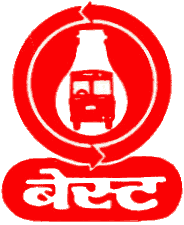
The Brihanmumbai Electricity Supply and Transport Undertaking (BEST) is a civic transport and electricity provider public body based in Mumbai, Maharashtra, India. It was originally set up in 1873 as a tramway company called "Bombay Tramway Company Limited". The company set up a captive thermal power station at the Wadi bunder in November 1905 to generate electricity for its trams and positioned it to also supply electricity to the city and re-branded itself to "Bombay Electric Supply & Tramways (BEST)" Company. In 1926, BEST also became an operator of motor buses. In 1947, the BEST became an undertaking of the Municipal Corporation and rebranded itself to "Bombay Electric Supply & Transport (BEST)". In 1995 the organisation was renamed to "Brihanmumbai Electric Supply & Transport (BEST)" alongside Mumbai. It now operates as an autonomous body under the Municipal Corporation.

Kerala State Electricity Board (KSEB) is an Indian public sector undertaking under the Government of Kerala that generates, transmits and distributes electricity in the state under government monopoly. Established in 1957, the agency comes under the authority of the Department of Power. It has been registered under Indian Companies Act 1956 during January 2011.

Ollur is a major suburban area and an old commercial town in the city of Thrissur of Kerala state, South India. It is about five kilometres (3.1 mi) away from Swaraj Round on old National Highway 47 (India) towards Kochi. From ancient time onwards, Ollur was a major business centre in Thrissur district. Now, this geographical area is part of Thrissur Municipal Corporation. It is situated between Kuriachira and Thalore on the National Highway. However, a specific identity for this geographical region is still there due to the urban setting of this region and its important religious institutions.

The Ministry of Power is an Indian government ministry. The current Union Cabinet Minister is Raj Kumar Singh. The ministry is charged with overseeing electricity production and infrastructure development, including generation, transmission, and delivery, as well as maintenance projects.
The Delhi Vidyut Board (DVB) was formed by the Government of Delhi in 1997 for the purpose of generation and distribution of power to the entire area of NCT of Delhi except the areas falling within the jurisdiction of New Delhi Municipal Council and Delhi Cantonment Board. On 1 July 2002, The Delhi Vidyut Board was unbundled into six successor companies:
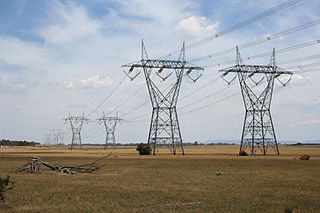
Energy in Victoria, Australia is generated using a number of fuels or technologies, including coal, natural gas and renewable energy sources. Brown coal, historically, was the main primary energy source for the generation of electricity in the state, accounting for about 85% of electricity generation in 2008. The amount of coal-fired power has decreased significantly with the closure in 2017 of the Hazelwood power station which supplied around 20% of Victoria's electricity, and to a lesser extent with the exit of Anglesea power station in 2015. Brown coal is one of the largest contributors to Australia's total domestic greenhouse gas emissions and a source of controversy for the country. Australia is one of the highest polluters of greenhouse gas per capita in the world.

Delhi Transco Limited (DTL), formerly Delhi Power Supply Company Limited (DPSCL) is the State Transmission Utility for the National Capital Territory of Delhi. It is responsible for the transmission of power at 220 kV and 400 kV level and for upgrading, operating and maintaining the high voltage network.

Vadakkechira is one of the four oldest ponds in Thrissur city of Kerala in India. It was built by Shakthan Thampuran (1751-1805) and is one of Thrissur's famous landmarks. It is owned by Cochin Devaswom Board.
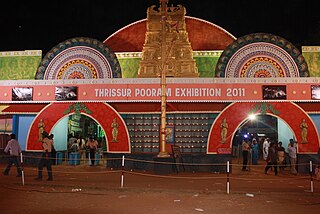
All India Agricultural, Industrial, Educational and Cultural Exhibition or commonly called the Thrissur Pooram Exhibition is an exhibition organised jointly by Paramekkavu Bagavathi Temple Devaswom and Thiruvambadi Sri Krishna Temple Devaswom, ahead of Thrissur Pooram in Thekkinkadu Maidan in Thrissur city. It is usually conducted over a period of 40 to 50 days during the Thrissur Pooram.The exhibition is the largest in Kerala in terms of attendance and floor space.
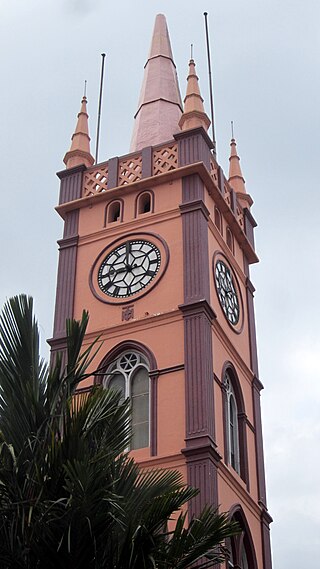
The Thrissur Municipal Corporation is the civic body that governs the Thrissur city in Kerala, India. It is the third largest city Corporation in the state of Kerala by area and fourth largest in population. Established as a Municipality since 1921 under the Cochin Municipal Regulations, it is responsible for civic infrastructure and administration; the distribution of electricity and water for Thrissur city. The Corporation manages 101.42 km of Thrissur city limits of through 55 wards through five zones Ayyanthole, Vilvattom, Ollukkara, Ollur and Koorkanchery. Thrissur Municipal Corporation has been formed with functions to improve the infrastructure of town.

Nehru Park, Thrissur, is a children’s park named after first Prime Minister of India Jawaharlal Nehru and is owned by Thrissur Municipal Corporation in Thrissur City of Kerala, India. The park also have aquarium.
Administration of Thrissur, Kerala, India, is handled by the Thrissur Municipal Corporation, consisting of 55 councilors and headed by the city's mayor.

The electricity sector in the Philippines provides electricity through power generation, transmission, and distribution to many parts of the country. The Philippines is divided into three electrical grids, one each for Luzon, the Visayas and Mindanao. As of June 2016, the total installed capacity in the Philippines was 20,055 megawatts (MW), of which 14,348 MW was on the Luzon grid. As of June, 2016, the all-time peak demand on Luzon was 9,726 MW at 2:00 P.M. on May 2, 2016; on Visayas was 1,878 MW at 2:00 P.M. on May 11, 2016; and on Mindanao was 1,593 MW at 1:35 P.M. on June 8, 2016. However, about 12% of Filipinos have no access to electricity. The Philippines is also one of the countries in the world that has a fully functioning electricity market since 2006 called the Philippine Wholesale Electricity Spot Market(WESM) and is operated by an independent market operator.
The two Bolton power stations supplied electric power to the town of Bolton and the wider area between 1894 and 1979. The first power station was located in Bolton town centre but by 1910 was too small to meet the growing demand for electricity. A large coal-fired power station was commissioned in 1914 situated at Back o’ th’ Bank about 1 mile north of the town centre. The electricity generating station was redeveloped several times until it was closed in 1979 and was subsequently demolished and the site redeveloped.
References
- ↑ "Thrissur Corporation Electricity Department". Mathrubhumi. Retrieved 17 January 2018.
- ↑ "Govt told to define role of TCED". The New Indian Express. Archived from the original on 4 March 2016. Retrieved 8 March 2010.